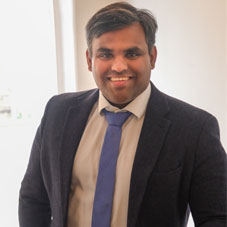
Ashwin Sridhar
Consultant Urological Surgeon
Technological innovation in urological conditions is vital as it requires early detection, timely intervention, and improved outcomes for a better quality of life. Here’s why Ashwin Sridhar, a highly-recognized specialist & surgeon is working diligently to amalgamate patient care with AI to ensure people receive the complete support and treatment they need to lead fulfilling lives.
Ashwin, an acclaimed urological surgeon, completed his medical training in India and then moved to the UK to complete his surgical and urology training and became a certified specialist in London. Throughout his journey, he has achieved various training milestones but more specifically, his interest lay in innovative technology and education. He specializes in robotic surgery and invasive surgical techniques and works with great teams to bring improvement in the field of urology.
He has presented at multiple national and international conferences, and his work has been published in various prestigious peer-reviewed journals. At present, Ashwin is a consultant urologist and surgeon at the University College London Hospital NHS Trust, a leading NHS hospital in the UK, constantly voted by patients to be the top 10 in the world for Urology. Let’s hear it from Ashwin!
How are you leveraging health information technologies in healthcare decision-making and investigations?
We are incorporating technology in various aspects of patient-centered care. We use technology to educate doctors so that the whole system develops better care, assesses and maintains quality, and improves the delivery of care. We have developed a health information record system to streamline the clinical workflow for patients visiting us from across the world.
We use that information to develop surgical planning to offer the patients the best care for their particular condition. I have worked with expert multidisciplinary teams and industry to use Artificial Intelligence and machine learning for image analysis, surgical outcomes, quality of care, and improving diagnostics.
AI also helps us with data that we can potentially get from remote wearable sensors and remote monitoring platforms to track post-op recovery. This enables patients to be healthier in their environment rather than being in the hospital.
Tell us about your leadership approach.
The center of good leadership is leading by example and maintaining very high ethical standards and I believe this is the only central column around which all other leadership qualities need to be built. With this approach, leaders can foster open communication with their team members. This allows team members to feel psychologically safe within the team and provides an environment for people to be empowered and excel in what they are capable of doing.
As a leader, I don't see it as my prerogative to mentor everybody, but to find the right mentor for the right person within the team so that they can reach their full potential. I also believe it is very important to balance decisiveness with collaborative decision-making. Each team member can have multiple great ideas but then it's about prioritizing what works best with the central vision.
We use that information to develop surgical planning to offer the patients the best care for their particular condition. I have worked with expert multidisciplinary teams and industry to use Artificial Intelligence and machine learning for image analysis, surgical outcomes, quality of care, and improving diagnostics.
AI also helps us with data that we can potentially get from remote wearable sensors and remote monitoring platforms to track post-op recovery. This enables patients to be healthier in their environment rather than being in the hospital.
My focus is to try and use research, technology, and innovation as much as possible to provide better care for patients
Tell us about your leadership approach.
The center of good leadership is leading by example and maintaining very high ethical standards and I believe this is the only central column around which all other leadership qualities need to be built. With this approach, leaders can foster open communication with their team members. This allows team members to feel psychologically safe within the team and provides an environment for people to be empowered and excel in what they are capable of doing.
As a leader, I don't see it as my prerogative to mentor everybody, but to find the right mentor for the right person within the team so that they can reach their full potential. I also believe it is very important to balance decisiveness with collaborative decision-making. Each team member can have multiple great ideas but then it's about prioritizing what works best with the central vision.
What is the future destination you are headed towards?
My focus is to try and use research, technology, and innovation as much as possible to provide better care for patients and improve the health of our fellow doctors as well. We are hoping to expand access to high-quality care whether it is by tele mentoring or tele surgery or telemedicine or physically going to other places to train teams.
I'm keen on educating and developing the next generation of leaders in urology and cancer. As a director for fellowships within our center, the focus is on what the teams need and to help them develop into good leaders.
Leveraging technology & innovation, we are trying to gather data to understand this field a little bit better, namely the personalized treatment approaches to patients to improve outcomes. So certainly, we are working with industry to use this data to provide some direction on how we can use this to improve healthcare for patients. In the future, I hope to be able to advocate for healthcare policies to improve equity and access to care for everybody across the globe.
What advice would you give to aspiring leaders in this field?
The most important thing is to be humble and honest with your work and always put the patients and the people you want to benefit at the center of care. Cultivate clinical expertise, leadership & technical skills, and build a strong professional network. Be curious, looking for opportunities, and initiatives to make things better.
Ashwin Sridhar, Consultant Urological Surgeon, University College Hospital London
Having an MBBS from the Bangalore Medical College and Research Institute in India, and an MSc in Surgical Technology from the Imperial College London as well as a postgraduate diploma in clinical education from UCL, Ashwin holds extensive experience in the management of prostate and bladder conditions, with particular expertise in robotic surgery. Outside of his professional world, he loves to travel with family and explore new cultures and cuisines.
My focus is to try and use research, technology, and innovation as much as possible to provide better care for patients and improve the health of our fellow doctors as well. We are hoping to expand access to high-quality care whether it is by tele mentoring or tele surgery or telemedicine or physically going to other places to train teams.
I'm keen on educating and developing the next generation of leaders in urology and cancer. As a director for fellowships within our center, the focus is on what the teams need and to help them develop into good leaders.
Leveraging technology & innovation, we are trying to gather data to understand this field a little bit better, namely the personalized treatment approaches to patients to improve outcomes. So certainly, we are working with industry to use this data to provide some direction on how we can use this to improve healthcare for patients. In the future, I hope to be able to advocate for healthcare policies to improve equity and access to care for everybody across the globe.
What advice would you give to aspiring leaders in this field?
The most important thing is to be humble and honest with your work and always put the patients and the people you want to benefit at the center of care. Cultivate clinical expertise, leadership & technical skills, and build a strong professional network. Be curious, looking for opportunities, and initiatives to make things better.
Ashwin Sridhar, Consultant Urological Surgeon, University College Hospital London
Having an MBBS from the Bangalore Medical College and Research Institute in India, and an MSc in Surgical Technology from the Imperial College London as well as a postgraduate diploma in clinical education from UCL, Ashwin holds extensive experience in the management of prostate and bladder conditions, with particular expertise in robotic surgery. Outside of his professional world, he loves to travel with family and explore new cultures and cuisines.


